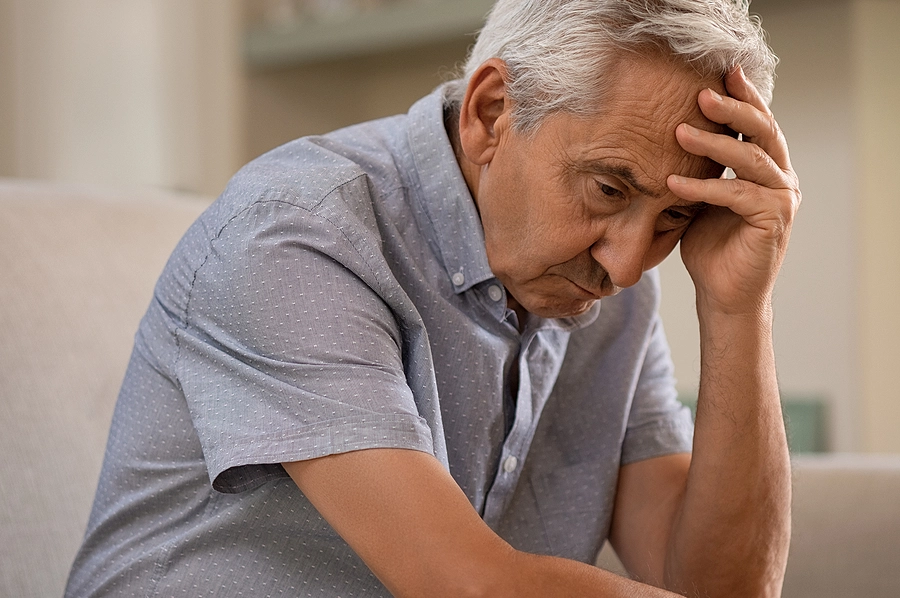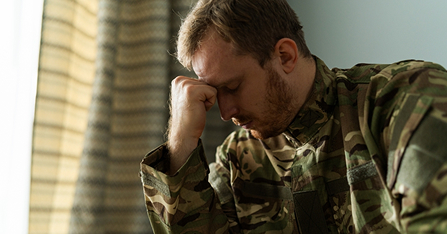Receiving a VA claim denial as a veteran with depression can be discouraging, but you have the right to appeal for the disability benefits you deserve for your service-connected mental health condition.
Summary
- Depression often impacts veterans during and after military service, with many only receiving a formal diagnosis post-service.
- The VA provides compensation for service-related depression, but claims are often denied.
- Veterans must provide a formal diagnosis, evidence of depression’s impact on daily life, and a service-related trigger to qualify for VA benefits.
- Veteran depression claim denial attorneys can strengthen appeals by gathering evidence, drafting persuasive statements, and guiding veterans through the complex VA appeals process.
Many veterans suffer from depression during and after their active duty military service. Unfortunately, a veteran may not be formally diagnosed with depression until after they leave the military despite exhibiting symptoms during service.
If left untreated, this psychological disorder can have devastating consequences for former servicemembers and their families. At VetLaw, our role is to help a veteran dealing with a VA depression claim denial build an appeal for disability benefits.
Our veteran disability claim appeals attorneys are highly regarded for their results and the way they treat clients. However, you don’t have to take our word for it- learn more about our legal services for yourself in an initial consultation.
We offer free case reviews to prospective clients, so you can meet with a lawyer one-on-one and discuss your options. Schedule a free consultation with VetLaw by calling (855) 942-5414 or submitting an online contact form.

Contact Us Today
We Will Fight For Your Benefits
We guarantee 100% privacy. Your information will not be shared.
Pursuing a VA Disability Claim for Depression
Fortunately, the Department of Veterans Affairs (VA) offers compensation to veterans who suffer adverse effects of service-related conditions. The development of any acquired psychiatric disorder, including depression, may result in the entitlement to service connection for the condition.
In some cases, a veteran may receive a denial from the VA for their depression claim. This can further exacerbate the situation and cause frustration and additional health complications.
It is best to seek the advice of a well-versed attorney from VetLaw’s team before filing depression claims. If the VA denied your claim for disability compensation, then you should schedule a meeting with a VA-accredited lawyer. They can help you assert your entitlement to disability compensation.
MEDICAL REQUIREMENTS FOR OBTAINING DISABILITY BENEFITS
Depression symptoms differ from person to person. However, the most commonly reported symptoms of depression include:
- Feelings of sadness or hopelessness
- Loss of interest or pleasure in daily activities
- Eating too much or too little
- Sleeping too much or too little
- Chronic fatigue
38 Code of Federal Regulations §4.130 outlines the criteria the VA uses to assess the severity of an applicant’s depression based on the impact their condition has on their daily life.
The effects of depression can range in severity from minimal impact on daily tasks to complete inability to function. The VA rates these effects on a scale from zero to 100 percent disability.
Additionally, if a veteran is rated below 100 percent for an acquired psychiatric disorder, including depression, entitlement to a total disability rating based on individual unemployability, or TDIU, may be available.


THE STANDARD OF PROOF FOR DEPRESSION CLAIMS
In order to receive benefits, a veteran must show they have a current diagnosis of depression. Medical records, physicians’ statements, and even lay evidence from friends or family members who can attest to mental disorder symptoms are helpful to include with a claim for entitlement to service connection for depression.
A veteran must also be able to point to a specific incident that took place during active duty or prove that symptoms of depression began during service. This is known as providing entitlement to service connection. It plays an important role in receiving benefits as a psychiatrically disabled veteran.
A VA-accredited attorney can help a former servicemember decide what evidence to send to VA to be over-prepared. Otherwise, VetLaw’s team of lawyers can help an applicant file an appeal after receiving a denial of benefits.
Recent Changes to the Appeals Process
Under the Appeals Modernization Act, which applies to all denials issued on or after February 19, 2019, veterans may file a direct appeal on VA Form 10182. This is a request for review by the Board of Veterans’ Appeals (BVA).
If the denial was issued prior to February 19, 2019, a legacy Notice of Disagreement (NOD) must be filed with a local VA office before appealing the case to BVA.
SCHEDULE A MEETING WITH AN ATTORNEY TO DISCUSS APPEALING A VETERAN DEPRESSION CLAIM DENIAL
For veterans following VA’s appeal procedures for a veteran depression claim denial, retaining an attorney who has experience with challenging the agency’s decision can make a substantial difference in reaching a favorable outcome.
A qualified legal representative can look through your records to determine what additional evidence may be needed to make your argument more persuasive to VA. Additionally, a lawyer can draft statements advocating for your benefits for depression to be granted or increased.
To begin an appeal of entitlement to service connection for depression or another acquired psychiatric disorder, call our firm today and schedule an initial consultation with us. You can reach us at (855) 942-5414 or submit an online contact form.
Frequently Asked Questions
While the DSM-5 recognizes several types and subtypes of depression, veterans are most likely to deal with Major Depressive Disorder or Persistent Depressive Disorder. The former is the more severe of the two.
Veterans may also develop depression due to other medical conditions, such as cancer or anxiety. This tends to be more common with chronic conditions or traumatic injuries. If the other medical condition is service-connected, a veteran may be able to claim VA benefits for depression as a secondary condition.
Yes, the VA provides compensation for depression, anxiety, and several other mental health conditions that can be impacted by military service. Veterans who successfully demonstrate eligibility for benefits receive monthly disability compensation from the VA commensurate with their depression VA rating.
If a veteran has multiple service-connected mental health issues, the VA will assign one rating encompassing their mental conditions. The veteran’s monthly compensation would be based off of that percentage.
The VA applies the Benefit of the Doubt doctrine when evaluating veteran disability claims. However, the VA still denies a significant percentage of initial claims, even though this policy offers veterans a small advantage.
Assuming that the VA denied your depression disability claim for another reason besides a simple paperwork error, there are several possible explanations as to why the VA rejected your claim.
You might not meet the VA’s criteria if you have a Dishonorable discharge, or if you didn’t complete your service agreement. Alternatively, you may have failed to provide a formal medical diagnosis or proof that your depression is severe enough to deserve the minimum compensable rating.
The VA also denies claims that fail to identify a credible medical nexus. That could mean you didn’t provide convincing evidence an in-service trigger exists. Or, maybe the in-service event you identified doesn’t appear to have caused or worsened your depression.

